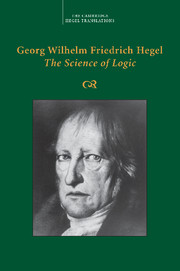Section II - Magnitude (Quantity)
Published online by Cambridge University Press: 30 September 2021
Summary
The difference between quantity and quality has been indicated. Quality is the first, immediate determinateness. Quantity is the determinateness that has become indifferent to being; a limit which is just as much no limit; being-for-itself which is absolutely identical with being-for-another: the repulsion of the many ones which is immediate non-repulsion, their continuity.
Because that which exists for itself is now so posited that it does not exclude its other but rather affirmatively continues in it, it is then otherness, inasmuch as existence surfaces again on this continuity and its determinateness is at the same time no longer simple self-reference, no longer the immediate determinateness of the existent something, but is posited as repelling itself from itself, as referring to itself in the determinateness rather of an other existence (a being which exists for itself ); and since they are at the same time indifferent limits, reflected into themselves and unconnected, determinateness is as such outside itself, an absolute externality and a something just as external; such a limit, the indifference of the limit as limit and the indifference of the something to the limit, constitutes the quantitative determinateness of the something.
In the first place, we have to distinguish pure quantity from quantity as determinate, from quantum. First, pure quantity is real being-for-itself turned back into itself, with as yet no determinateness in it: a compact, infinite unity which continues itself into itself.
Second, this quantity proceeds to determinateness, and this is posited in it as a determinateness that at the same time is none, is only external. Quantity becomes quantum. Quantum is indifferent determinateness, that is, one that transcends itself, negates itself; as this otherness of otherness, it lapses into infinite progress. Infinite quantum, however, is sublated indifferent determinateness: it is the restoration of quality.
Third, quantum in qualitative form is quantitative ratio.Quantum transcends itself only in general; in the ratio, however, it transcends itself into its otherness, in such a way that this otherness in which it has its determination is at the same time posited, is another quantum. With this we have quantum as turned back into itself and referring to itself as into its otherness.
- Type
- Chapter
- Information
- Georg Wilhelm Friedrich Hegel: The Science of Logic , pp. 152 - 153Publisher: Cambridge University PressPrint publication year: 2010

